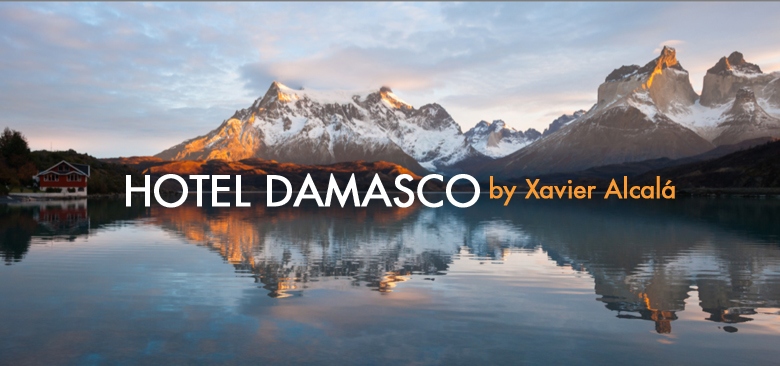Yusef Elías the Turk, a travelling merchant, arrived at the store in the midst of a blinding snowstorm, in need of shelter from the weather. Varela and Julián helped him loose his horses in the corral and unload his wagon; and thus he became an unwilling guest with little hope of continuing on his journey home, way up north. The need to sell had compelled this weather-beaten man to venture further south than prudence recommended.
Elías told Varela that he was a Christian and, like so many others scornfully labelled “Turks”, had only his birth in the tyrannical Moslem Empire of Turkey to thank for being bridled with such an insulting name. Elías must have been about fifty. He was a tall man, with grey eyes and hair and a drooping moustache on his kind face, and often announced to anyone who would listen that he was the father of six daughters, some of them of marriageable age. This hibernation — forced on him by the snow — didn’t worry him much; he knew the girls would not go hungry since they were all hardworking and willing to sew under his wife’s supervision. What he worried about night after sleepless night was the thought of them praying for him, one day for his safe return, the next for his soul…
It was Elías who put the idea into Varela’s head. In his laboured way of speaking, he’d explained that it would be of benefit to both of them to go into business together. The money to be made in those parts was in sheep, wagon trains, lodging houses and supplies. Amidst the roar of a snowstorm lashing the corrugated-iron walls and roof, Yusef’s eyes glazed over as he talked of a marvellous city in his homeland, whose people lived richly off the caravans travelling east to west and north to south.
They’d go about things in an honest and upright way; first of all they’d buy the place from Domingo Candelaria who continued to live in comfort back in town, accumulating wealth without suffering any of the hardship. Then they’d make an account of the new company’s capital, each partner’s share and their functions within it. On this last matter, Elías felt that he should take charge of purchasing and sales while his friend Varela would manage the premises.
With the first signs of spring, Yusef loaded up his things and set off, counting on the weather improving the further north he travelled. Soon, the first of the wagons from the coast appeared and the store was once more filled with noise and smoke. Julián and Manuel couldn’t cope with so many customers. When the indians paid their next visit, Julián persuaded one of his “brozers” to stay and help.
Manuel sent letters back with the driver of the next wagon. He told Héctor about Elías’s idea and asked his opinion. He wrote to Paulina about all the progress that he had made and how he was going to become a cattle rancher; and he asked her to send him some of her news.
The next wagon didn’t bring a single reply. But it did bring an interesting character, a reporter from the newspaper that had started up in the oil-town. He had come to study “the frontier question” and took a number of photographs of the administrator of the store, whom he referred to as “a pioneer”.
Jorge Acuña, journalist and photographer, was a talkative man with a laugh always on his lips. When Varela asked him to deliver a copy of his picture to Paulina at Hotel Damasco, Acuña asked:
“D’you mean to the Turk’s little girlfriend?” and, alarmed by the look on Manuel’s face, he chuckled nervously. “Well, that’s what they say, my friend,” he said, trying to make amends. “You know how people talk…”
Manuel Varela felt as if something was gnawing away at his insides and started plotting his way out of this damn adventure in lands that didn’t even figure on the maps. Nothing could be worth more than Paulina Mouzo’s lovely body and her beautiful long lashes. For days he worked on an emergency trip, single-handed — just himself and a troop of horses — leaving the running of the business in the hands of divine providence.
He’d leave, and see if he cared if it all burned to the ground…
He was completely wrapped up in these plans when the course of his life — which had all started at a spinning session in that part of the world that has been known as Galicia ever since it had a name — took a new direction once again.
Acuña had left on a tour of the border accompanied by the young indian whom Varela had christened Gabriel. Julián was off negotiating the purchase of sheep. The storekeeper was alone, listlessly attending to a few clients at the bar, when he heard the sound of a large carriage drawing up outside. Soon after, the door opened to make way for two figures with their heads wrapped in cloth, eyes veiled and long dustcoats swathing their bodies from throat to feet. In spite of all this drapery, it was clear that the figures were women.
They stopped and waited in the centre of the saloon until a third figure appeared, also in a dustcoat but with his head bared.
“Elías!” Manuel Varela left his customers and hurried over to greet him with a warm embrace. Then Yusef introduced his companions.
“Look, Manuel, here are two of my daughters. This one is Ana and this one is Susana.”

